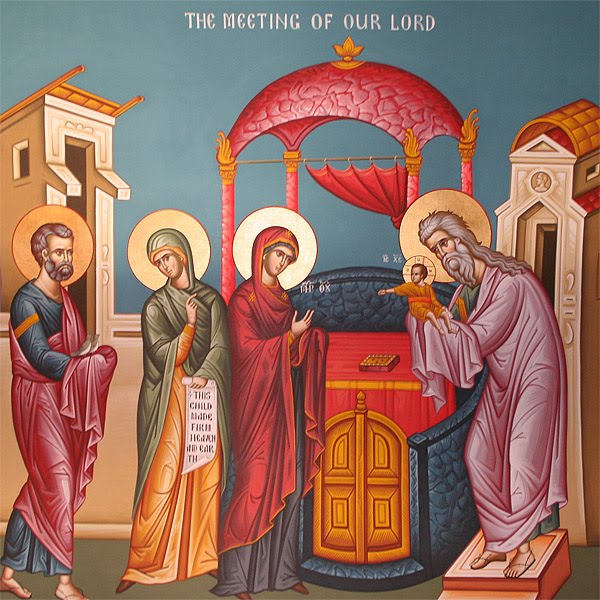Today is precisely 40 days after Christmas, and that means we are celebrating a feast day that marks the official end of the "extended Christmas season", as it were - the time of the year related to the birth and early life of Christ. In the English-speaking Latin Christian tradition, today's feast is usually called Candlemas. But it is also one of the 12 Great Feasts of the Orthodox Church, officially known as...
The Meeting of the Lord in the Temple
(also called the Presentation of the Lord in the Temple)
This Great Feast celebrates the event described in
Luke 2:22-35, when the infant Christ was taken to the Temple of Jerusalem by His parents, in accordance with the purification rites of the Law of Moses (Leviticus 12:2-8). It was one of the many acts of obedience to the Law carried out by Christ and His mother, in order to fulfill the Law. And so this Feast is primarily about the transition from the Old Law to the New Law. The appointed Epistle reading (Hebrews 7:7-17) reflects this, as it talks about the old priesthood and the new priesthood.
When Christ's earthly parents arrived with Him at the Temple, they were met by the Elder Simeon and the Prophetess Anna, who happened to be there by divine providence. The Elder Simeon had been told in a prophecy that he would not die until he saw the Messiah. And so, as he picked up the infant Christ in his arms, he said the famous prayer that we recite near the end of every service of Vespers:
"Lord, now let Your servant depart in peace, according to Your word, for my eyes have seen Your salvation, which You have prepared before the face of all people, a light to enlighten the Gentiles, and the glory of Your people Israel."The Prophetess Anna also testified that Jesus was the Messiah, and Simeon told Mary that her Son would be the cause of the rising and falling of many in Israel, that He will be
"a sign which shall be spoken against", and furthermore that
"a sword shall pierce through your own soul also". This is considered to be a prophecy about the Passion of Christ, and about the great suffering that Mary herself would endure at the Cross. It is also the source of
this type of icon.
The Feast of the Meeting of the Lord is very ancient - in fact, you might be surprised by how old it is, considering the fact that it's generally not very well known. We have sermons written for this Feast in the early 300s. It became a particularly important Feast in Constantinople after the year 542, as it was associated with thanksgiving for the end of the Plague of Justinian.
There is a lot of spiritual significance in this Feast. It is important to notice that both of the people involved in
meeting Christ in the Temple - Simeon and Anna - were very old. They represent the Old Covenant, and Simeon's words allude to the fact that the Old Covenant is about to pass away and be replaced by the New. Just as Simeon himself is about to pass away from this life. Now that he has held the Messiah in his arms, he is ready to die. So, too, the Law of Moses is about to pass away, having witnessed the arrival of He who represents the fulfillment of the Law. Among the Great Feasts of the Orthodox calendar, the Meeting of the Lord marks the end of the part of the year when we celebrate the birth, infancy and early life of Christ. From now on, we look towards Great Lent, the Cross and the Resurrection.
There is an ancient custom to have a formal blessing of the candles on this occasion - ideally the whole supply of candles for the next year should be blessed today. This custom has been preserved in both the Orthodox Church and the Latin Christian traditions (Catholic and Anglican), and is the reason for the name "Candlemas" given to this holiday. It may seem random to connect this Feast with candles, but actually it flows from the words of the Elder Simeon, who said that Christ would be
"a light to enlighten the Gentiles" (Luke 2:32). So, candles and their light are in this case a symbol of the revelation that Christ has brought to the whole world.
As usual when I post to mark a Great Feast, here are some hymns for the occasion on YouTube:
Troparion for the Meeting of the Lord (in Greek and Arabic)
Troparion for the Meeting of the Lord (in Romanian)
That which came to pass in Thee - 9th Ode for the Feast of the Meeting of the Lord (in English)
That which came to pass in Thee - 9th Ode for the Feast of the Meeting of the Lord (in Arabic)
The entire service of Matins for the Feast of the Meeting of the Lord (in Arabic; this is one of the best collections of Arabic Orthodox chants that I have ever found on YouTube!)
Troparion:
Rejoice, O Virgin Theotokos, full of grace!
From you shone the Sun of Righteousness, Christ our God.
Enlightening those who sat in darkness!
Rejoice, and be glad, O righteous elder;
You accepted in your arms the Redeemer of our souls,
Who grants us the Resurrection.Kontakion:
By Your nativity, You did sanctify the Virgin's womb,
And did bless Simeon's hands, O Christ God.
Now You have come and saved us through love.
In the midst of wars grant peace to Your people,
And strengthen your Church, O only Lover of mankind!


